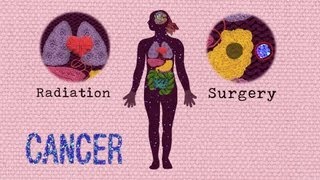(单词翻译:单击)
We all start life as one single cell.
每个人的生命都从一个细胞开始。
Then that cell divides and we are two cells, then four, then eight.
随后,这个细胞分裂成两个,然后四个,接着八个。
Cells form tissues, tissues form organs, organs form us.
细胞形成组织,组织形成器官,器官组形成我们。
These cell divisions, by which we go from a single cell to 100 trillion cells, are called growth.
这种细胞分裂,即我们从单细胞变成一百兆个细胞的过程,叫做“生长”。
And growth seems like a simple thing because when we think of it,
生长看似简单,因为一想到生长,
we typically think of someone getting taller or, later in life, wider, but to cells, growth isn't simple.
我们就会想到长高或者是中年发福,但对细胞而言,生长并非易事。
Cell division is an intricate chemical dance that's part individual, part community-driven.
细胞分裂,是繁复的化学舞蹈,一部分在细胞内发生,一部分受外界影响。
And in a neighborhood of 100 trillion cells, some times things go wrong.
在一个有百兆细胞的细胞群中,有时难免会出错。
Maybe an individual cell's set of instructions, or DNA, gets a typo, what we call a mutation.
也许某个细胞的生长指令,DNA,出现小错,我们称其为“突变”。
Most of the time, the cell senses mistakes and shuts itself down,
大多数时候,细胞自身会监测到错误,并及时自我毁灭。
or the system detects a troublemaker and eliminates it.
再有时,细胞系统会侦查到一个捣蛋鬼,并将其消灭。
But, enough mutations can bypass the fail-safes, driving the cell to divide recklessly.
但足够多的突变可以躲避自保机制,造成细胞不受控制地分裂。
That one rogue cell becomes two, then four, then eight.
一个不受控制的细胞变成两个,然后四个,八个。
At every stage, the incorrect instructions are passed along to the cells' offspring.
在每一个阶段,错误的讯息都会被传递给这细胞的后代。
Weeks, months, or years after that one rogue cell transformed, you might see your doctor about a lump in your breast.
几周,几个月,几年,一个异常细胞变异后,你可能因乳房肿块去看医生。
Difficulty going to the bathroom could reveal a problem in your intestine, prostate, or bladder.
排泄困难可能预示肠道、前列腺或膀胱有问题。
Or, a routine blood test might count too many white cells or elevated liver enzymes.
也可能在常规血验中发现白血球数量过高,或肝脏酵素过高。
Your doctor delivers the bad news: it's cancer.
随后医生告知你一个坏消息:是癌症。
From here your strategy will depend on where the cancer is and how far it's progressed.
至此以后,你的治疗策略会取决于癌细胞的位置和发展状况。
If the tumor is slow-growing and in one place, surgery might be all you need, if anything.
如果瘤生长缓慢并聚集一处,可能手术治疗就可以根除。

If the tumor is fast-growing or invading nearby tissue, your doctor might recommend radiation or surgery followed by radiation.
如果瘤生长迅速并侵袭周围细胞,那医生可能推荐放射疗法或手术摘除和放疗相结合。
If the cancer has spread, or if it's inherently everywhere like a leukemia,
如果癌症已扩散,或像血癌一样本身就蔓延于全身,
your doctor will most likely recommend chemotherapy or a combination of radiation and chemo.
医生多半会推荐化疗,或化疗与放疗结合治疗。
Radiation and most forms of chemo work by physically shredding the cells' DNA or disrupting the copying machinery.
放疗和多数的化疗,都运用物理方法破坏细胞的DNA,或扰乱细胞复制机制。
But neither radiation nor chemotherapeutic drugs target only cancer cells.
但放疗和化疗破环的不单单是癌细胞。
Radiation hits whatever you point it at, and your blood stream carries chemo-therapeutics all over your body.
放疗会攻击所有被照射的细胞,而血液会将化疗的药物传递至全身。
So, what happens when different cells get hit?
那么,不同细胞被攻击时会发生什么呢?
Let's look at a healthy liver cell, a healthy hair cell, and a cancerous cell.
让我们分别看看一个健康的肝细胞,一个健康的毛发细胞和一个癌变细胞。
The healthy liver cell divides only when it is stressed; the healthy hair cell divides frequently;
健康的肝细胞只有在危机时才分裂;健康的发细胞却常常分裂;
and the cancer cell divides even more frequently and recklessly.
而癌变的细胞分裂速度更快更肆无忌惮。
When you take a chemotherapeutic drug, it will hit all of these cells.
当你服用化疗药物后,它会攻击所有以上细胞。
And remember that the drugs work typically by disrupting cell division.
而化疗药物一般通过扰乱细胞分裂来达到治疗效果。
So, every time a cell divides, it opens itself up to attack,
所以,每次细胞分裂时,它就会受到化疗药物的攻击,
and that means the more frequently a cell divides, the more likely the drug is to kill it.
这意味着细胞分裂得越快,越容易被杀死。
So, remember that hair cell? It divides frequently and isn't a threat.
记得之前讲的发细胞?它常常分裂且对健康无害。
And, there are other frequently dividing cells in your body like skin cells, gut cells, and blood cells.
身体里还有其他时常分裂的细胞,比如皮肤细胞,肠细胞和血细胞。
So the list of unpleasant side effects of cancer treatment parallels these tissue types:
所以抗癌药物的副作用会集中在这些组织上;
hair loss, skin rashes, nausea, vomiting, fatigue, weight loss, and pain.
脱发,出疹,晕眩,呕吐,疲惫,体重减轻,疼痛。
That makes sense because these are the cells that get hit the hardest.
这都是意料之中的事,因为这些快速分裂的细胞会被攻击。
So, in the end, it is all about growth.
所以说到底就是攻击生长。
Cancer hijacks cells' natural division machinery and forces them to put the pedal to the metal, growing rapidly and recklessly.
癌症劫持细胞自然分裂的机制并迫使细胞以最快速度分裂,肆无忌惮地生长。
But, using chemotherapeutic drugs, we take advantage of that aggressiveness, and we turn cancer's main strength into a weakness.
但运用化疗药物,我们借力打力,将癌细胞的绝招变成败笔。


